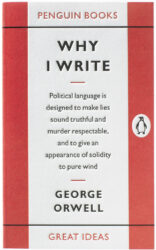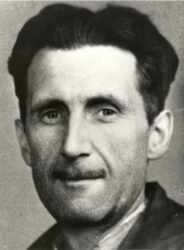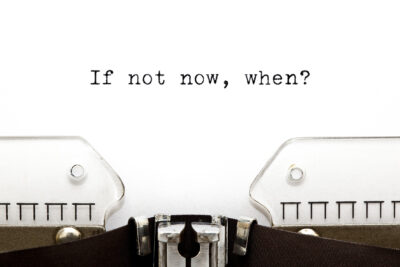
Writing a book is a horrible, exhausting struggle, like a long bout of some painful illness.
One would never undertake such a thing if one were not driven on by some demon whom one can neither resist nor understand.
~ George Orwell
 In 1949, George Orwell sat in a room in London and wrote his famous essay, “Why I Write.” It’s short, to the point, and timeless.
In 1949, George Orwell sat in a room in London and wrote his famous essay, “Why I Write.” It’s short, to the point, and timeless.
Hardened by his time fighting for the POUM (Partido Obrero de Unificación Marxista) militia of the Republican army during the Spanish Civil War and the unrelenting horrors of World War II, in “Why I Write” Orwell examines his motives behind his choice to become a writer. In doing so, he touches on four universals he felt characteristic of most writers:
-
Sheer egoism.
-
Aesthetic enthusiasm.
-
Historical impulse.
-
Political purpose.
Orwell offers an explanation for choosing each of these points. He acknowledges that at any given time in history one motive might surmount the others. Writers are products of their times.
For Orwell, his times and experiences led him to warn of the dangers of totalitarianism, not just Fascism but Soviet Communism as well. Like me, anyone who read Animal Farm in high school or 1984 in a university literature class will likely be nodding their heads in agreement right now. And don’t forget Homage to Catalonia, his paean to Spain and the Spanish Civil War.
Over the years, Orwell’s essay spawned a deluge of similarly titled pieces. Joan Didion, Chuck Palahniuk, Terry Tempest Williams, Eileen Myles, Patti Smith, Karl Ove Knausgaard all chimed in, too, among many others.
Terry Tempest Williams’s lists 71 reasons for why she writes. It reads like a prose poem:
I write to make peace with the things I cannot control. I write to create fabric in a world that often appears black and white. I write to discover. I write to uncover. I write to meet my ghosts. I write to begin a dialogue. I write to imagine things differently and in imagining things differently perhaps the world will change. I write to honor beauty. I write to correspond with my friends. I write as a daily act of improvisation. I write because it creates my composure. I write against power and for democracy. I write myself out of my nightmares and into my dreams. …
I often ask myself the very same question, “Why do I write?” Usually once a week. Sometimes once a day. Why do I subject myself to this “exhausting struggle,” which reminds me of endless homework hanging over my head? Why can’t I be like everybody else, lying back on the couch, watching football or the Emmys?
So, why do I write?
The tools were all there, lined up like stuffed pandas in a shooting gallery at a state fair. I’d read the books, those by Brenda Ueland, Dorothea Brande, Ralph Keyes, as well as similar books by several different authors. Taken numerous Writer’s Digest classes. Written dozens of book reviews and op-eds. And submitted weekly cooking columns for The Cedar Key Beacon, too. But I still couldn’t quite make the leap to thinking of myself as a serious writer.
Then it happened.
Like many others have said, it took something catastrophic to yank me out of my on-again, off-again approach to writing.
The big C. Cancer. I became a statistic.
“One in eight women will develop breast cancer in their lifetimes.”
Lying on a cold steel table the first day of radiation, beams of radioactive material streaming into my chest, the future unknown, I told myself, “It’s now or never.” Faced with my mortality, unwilling to let my childhood writing dreams die, I signed up for a WordPress blog site.

And I wrote.
Many of my reasons for writing jibe with George Orwell’s and with Terry Tempest Williams’s as well. But my brush with Death sealed the deal with the demon Orwell describes.
Now I can’t not write.
Why do you write?
__________
![]()
This post is the last of four about books that encouraged me to take myself seriously as a writer.

Judi Cain
Thank you! This is inspiring for a person who has been on again, off again with not only writing, but also painting and photography. I’m learning that the creative energy flows, regardless of what medium I use, but only if I actually do it! And sometimes, especially today, reading this is just the affirmation that I needed to be clear to myself about why I must do it.
Cynthia D. Bertelsen
Hi Judi,
Thanks for the kind words. You are such a prolific artist, and I know what you mean. Do the work, that’s all you can do. Right?
Amber
Thank you for the great post, Cynthia! 🙂
Cynthia D. Bertelsen
Thanks, Amber!
Jenny Dearinger
Wonderful article! It makes me think about my own ‘why.’ Thank you!
Cynthia D. Bertelsen
Thanks, Jenny! Your “why” is different than anyone else’s, but it is an important question, isn’t it?
Connie Biddle Morrison
Hi Cindy, All your blog posts are non-stop reading, and this one is no different! You are truly a writer! And I thank you for sharing your insights.
Sharlyn
Poetry is playing with words in honor of meaning in three ways: each word has a history and a connotation but also a feel that may be shared with those who speak the same language, each form of rhythm has a feeling that is likewise recognizable, as in the sing-song of nursery rhymes, which all by itself conveys a feeling, and finally, the recognition of the thought has a vast history of outward meaning or relevance for the reader while at the same time hinting at a deeper inner meaning -a new idea. When a poem works, it seems to me, there is a recognition but more importantly a beckoning to an unforeseen conclusion. This way a work becomes an edifice, an augury, and a pathway to new worlds.
Cynthia D. Bertelsen
Sharlyn, yes, writing is about seeking connection and meaning, and poets do it very well indeed. “A pathway to new worlds,” yes, with the writer as a guide.